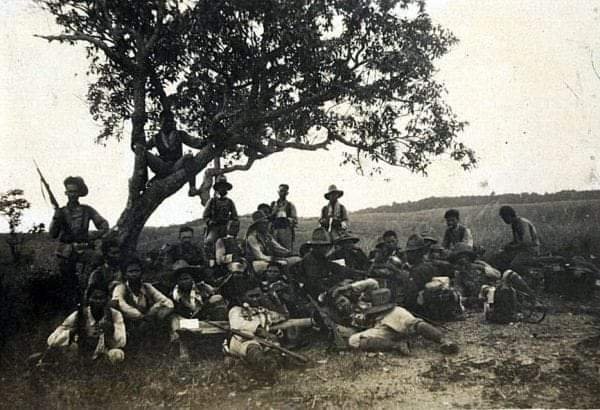NETHERLANDS MILITARY AGGRESSION TO ACEH
SECOND DUTY EQUIPMENT
On November 16, 1873, the commander of the second aggression left, Lieutenant General Van Swieten headed for Aceh carrying 60 warships equipped with 206 cannons, 22 mortars, 389 officers, 7888 ordinary soldiers, 32 doctors officers, 3565 people penalties for men who were forced to fight and 243 women sentenced.
Also the rows of horses (kaveleri) are complete with four officers and 75 subordinates along with warrior horses (agile). Not to forget also the army of engineers, complete with officers and tools, including railroads, tools for iron rafts, boat rafts and so on. As a result of this second expedition, his strength and equipment doubled from the first expedition. Instead, it was also brought by three religious officials, namely, a veldpridekter, a priest and a teacher of Islamic religion, namely H.M. Ilyas from Semarang.
Not only that, but also brought along from Java five
spies, arrived in Penang plus a few more
Chinese people who are good at language in Aceh, a Keling,
an Arab, one from Padang, one from Trumon
(South Aceh) and several other spies -
his. In Aceh alone awaiting an accomplice
Great Dutchman named Ali Bahanan.
Apart from Van Swieten himself as commander,
rut two other generals, namely Generaal Majoor Ver-
spijck as the second person and Generaal Majoor J.L.J.H.
Pel, also two colonels and four people Lieutenant Ko
lonel, beside a number of Majoor and the Captain already
lots of experience. The point is the Dutch preparations this time
pretty great.
other preparations from Gouverneur Generaal Louden,
that is:
He was able to persuade several kings in Java, so that to the warlord Lieutenant General Van Swieten and his deputy Major General Verspijck, he could be seconded to a senior officer.
giun Mangkunegara, Pangeran Ariogondosis-woro, officer of Paku Alam, R.M.P. For war, Pitmeester (Captain of the Horse Row) Barisan Bangkalan, Pangeran P. Adinegoro and
Barisan Sumenep officer, R.A. Kromo.
On the side of Aceh, the Commander of the Polem Cut Banta, in line with the
with other preparations, repeating orders
based on the Teungku Chik Kutakarang fatwa un
to continue the Sabil War against the Dutch infidel
want to colonize our Religion, Nation and Country. This daily command is spread to every mosque, meunasah and elsewhere on all occasions.
On November 23, 1873, the Dutch army began landing on the coast of Kuala Lue and the next day gathered in Kuala Gigieng. This landing was carried out under the leadership of deputy warlord Major General Verspijck.
Six days later it was only able to reach Kuala Aceh.
Although the Dutch armaments were very complete according to the size at that time, while the Acehnese were very lacking and simple, but thanks to the spirit of jihad which was fought by the clerics, the Acehnese were willing to sacrifice everything they had, property, even souls.
Thus after suffering a lot of casualties on both sides, then on January 24, 1874, the Aceh royal palace which had been vacated, could be occupied by the Dutch army.
The Sultan and other officials had fled before and moved the center of Aceh's administration, first to Luengbata then to Paga Aye. Shortly afterwards the Sultan of Aceh Mahmud Shah died, due to an attack of cholera.
The fall of the palace was a disaster which caused the situation to be very serious, so that it needed concentration of mind in taking further steps in order to continue the resistance.
One step taken was to hold a meeting which was attended by approximately 500 leaders and scholars.
Conference led by Imeum Luengbata and Teuku Lamnga. After the scholars gave explanations and opinions from the point of view of Islamic law, the meeting decided: Mandatory War of Sabil to expel Dutch kafirs. The decision was pronounced together as an oath, with a thunderous voice. (Said, 1961: 437). (The date of this event has not been found
in historical records).